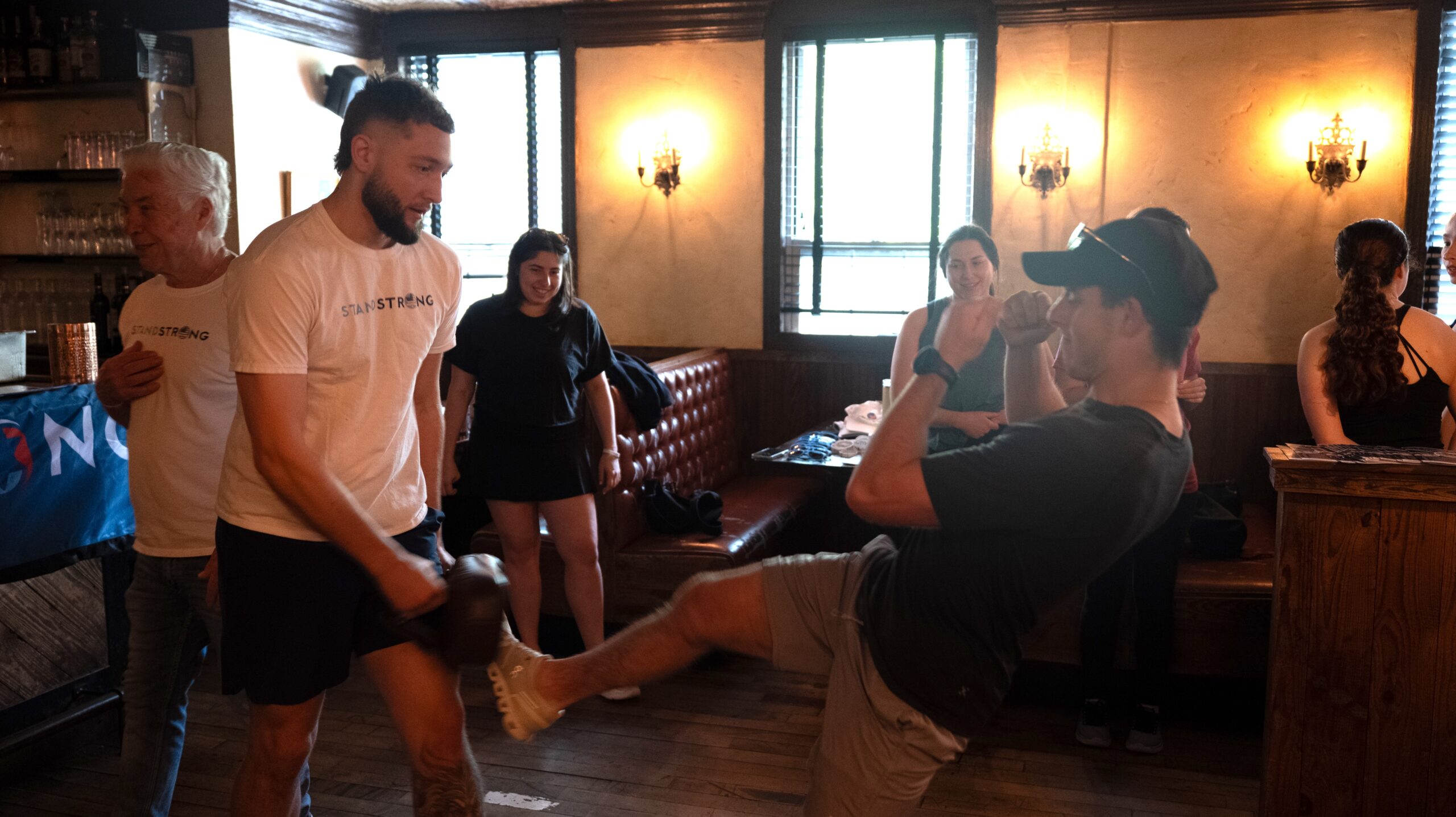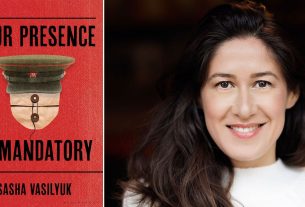Since its founding, StandStrong — a Chicago-based non-profit that wants Jews to have the confidence and skills to defend themselves — has hosted self-defense classes at Jewish community centers, synagogues and Jewish summer camps across the country.
But earlier this month, they brought their self-defense training, which draws from martial arts like Brazilian Jiu-Jitsu and Israeli Krav Maga and emphasizes dealing with real-life situations, to a brand-new location: The iconic 2nd Avenue Deli.
On a recent Sunday, patrons were enjoying an early lunch of pastrami sandwiches and matzah ball soup on the ground floor of the 2nd Ave Deli’s uptown location on First Avenue and East 75th Street. Meanwhile, upstairs, in the deli’s cocktail lounge, known as 2nd Floor Bar & Essen, some two dozen participants — who ranged in age from 20-somethings to seniors — practiced keeping their balance while kicking and slipping out of headlocks.
“We wanted to make the program very real for everyday people living their lives,” executive director Matt Travers told the New York Jewish Week. “It’s not a gym, obviously — you go to some martial arts gyms and it looks amazing. We’re more focused on, let’s go meet people where they’re at.”
Though hosting a self-defense class at an iconic New York deli might seem somewhat unusual, Travers insists the partnership makes perfect sense. After all, 2nd Avenue Deli experienced antisemitic vandalism shortly after Oct. 7, Travers pointed out.
“Situations are going to happen anywhere,” he said. “So let’s go meet you where you’re at and show you the skills to get out of that real situation.”
At the one-hour class, which was free of charge, two coaches taught participants a sampler of self-defense techniques and tips, including distance management — “It’s simple: If I’m close to him, he can hit me,” one coach explained — and verbal de-escalation techniques, like assertively and loudly saying key words like “Stop!”, which could draw attention from bystanders.
The second half of the class focused on how to escape harmful situations, like using a front body lock to defend against someone trying to physically pick you up. The trainees paired up to slowly practice these skills and maneuvers, as they gradually memorized the many steps involved (push your forehead into their clavicle, build a frame, then push your opponent’s hips). Later, coaches roamed around the room with boxing pads for people to practice push kicks; trainees were frequently reminded to maintain a proper “ready stance” with a low center of gravity.
After about an hour, the participants were feeling peckish. Fortunately, a platter of pastrami sandwiches, pickles and salads (egg, tuna, Israeli) was brought upstairs. Cold cans of Dr. Brown’s sodas were cracked open.
“I mean, to partner with Second Avenue Deli is pretty iconic,” Gabrielle Schoeffer, StandStrong’s marketing manager, told the New York Jewish Week.
The unlikely affiliation began after Schoeffer reached out to the 2nd Avenue Deli on Instagram and explained their mission, asking if they’d be willing to host a class in their space. Jeremy Lebewohl, the co-owner of the deli and the nephew of its founder, beloved “world-class noodge” Abe Lebewohl, said he was happy to partner with them for the event.
“It sounded like a good organization, especially given the chaos that we have in the world today,” Lebewohl said in a phone interview. “I think part of being a proud Jew is having that self-confidence, that you can take care of yourself if you need to.”
The self-defense class was the first of its kind for the deli, too, which normally hosts events like engagement and birthday parties in its cocktail lounge. “It’s not like we’ve used the space for things like this in the past — but, to be honest, no one’s ever asked,” he said.
Lebewohl said StandStrong “did offer to pay something for the space,” but he offered it up free of charge. “And we were happy to throw in some food, because it didn’t feel right for people to come into the deli and not have something to eat afterwards,” he said.
For one attendee — Lauren Nedelman, 37 — the deli food was the “most exciting part” of the class. “Yeah, it was definitely a win-win situation,” she said of the defense-class-plus-lunch combo.
Trainees with empty stomachs were rewarded with platters of 2nd Avenue Deli food. (Joseph Strauss)
Nedelman said she found out about the StandStrong class from a sponsored post that popped up on her Instagram feed — likely the result of her frequent engagement with pro-Israel social media accounts, she said.
“I just want to be able to walk in the streets of New York City and feel confident and be ready, at least for the basic necessities that I might need to use,” Nedelman said.
StandStrong was founded in 2020 by Chicago-based venture capitalist Ted Schwartz, who’d been concerned about rising antisemitism. At a meeting with the local Jewish Federation a year or two earlier, Schwartz said he was told about a study that had found that about two-thirds of students at a nearby public university had at some point denied being Jewish.
“That was the flip-the-switch moment for StandStrong,” Schwartz said.
“You can’t run and hide and let the hate win,” said Travers, who signed on shortly after the organization was founded. “You’ve got to be able to stand up.”
For Schwartz, 71, the idea to run self-defense classes was rooted in his childhood. Growing up in Chicago, Schwartz said he’d been bullied for being Jewish. He recalled “going through some enemy territory” on his way to Hebrew school. His father, a Holocaust survivor, instilled in him the message: “If you don’t fight, nobody’s going to do it for you.”
So Schwartz, who said his family couldn’t afford private self-defense classes at the time, enrolled in a free wrestling class during elementary school. “The guys from the other schools would see me at the wrestling [meets], so they knew I could wrestle — and it changed my life,” he said.
The idea behind the self-defense classes, Schwartz said, is not necessarily about learning physical skills like takedowns. Rather, it’s about building the confidence that comes with knowing how to escape or counteract potentially dangerous situations. Moreover, it’s about “empowering participants to take pride in who they are,” Schwartz said, by giving them the confidence to protect themselves, with physical self-defense being a last resort.
As Travers pointed during the Sunday session, merely having confident posture and body language can turn away a potential aggressor, helping diffuse a situation before it even starts.
“Our program is not centered on fighting or being aggressive,” said Travers, a UK native who’s trained in Krav Maga. “It’s [about saying], I’m allowed my opinion or identity and I’m proud to be here and have that discussion. If someone else wants to try and intimidate or bully me out of that, then I’ve got some skills to stay safe and get out of the situation.”
Travers added that StandStrong’s curriculum is applicable to all groups who might endure hate while out and about — not just Jews. Early on in the pandemic, Travers said, StandStrong ran “a lot” of classes for Asian groups who were facing a surge in discrimination.
Since its launch, StandStrong has expanded to have full-time staff in Miami, Los Angeles and Boston.
“Demand is, I always joke, unfortunately growing,” Travers said, adding that StandStrong’s call volume increased as protests erupted in the wake of Oct. 7. “Business is booming, but I wish we weren’t needed and there was no hatred in the world.”
For now, the organization doesn’t have any permanent staff in Ne York City. And so, they holds sessions here in recurring clusters, every six weeks or so. Travers and one of StandStrong’s Chicago-based coaches travel to the city for an extended weekend of classes; the most recent trip included the 2nd Avenue Deli session, a class with Jewish Instagram influencer Liv Schreiber and a group of about 40 women, as well as a few others.
StandStrong plans to soon hire full-time coach in New York to expand their programming here. And naturally, with more NYC programming may come more self-defense classes in world-famous delis.
“I think Katz’s Deli might be next,” Schoeffer said. “I don’t want to start any rumbles, but that’d be a really fun spot.”
Jewish stories matter, and so does your support.




